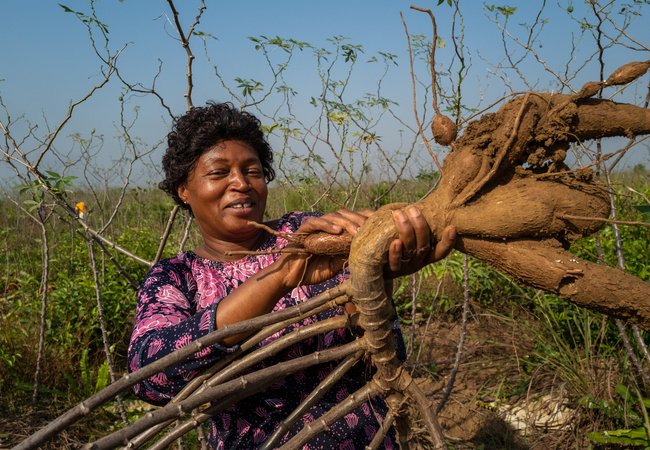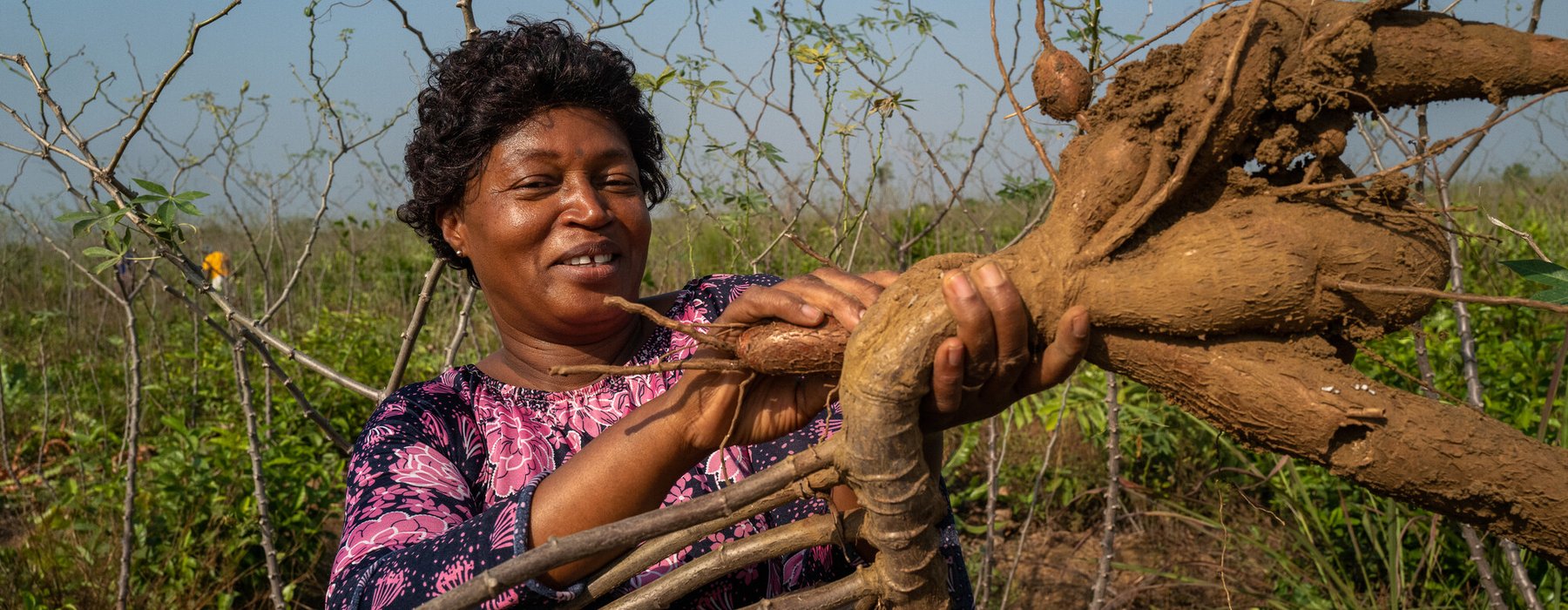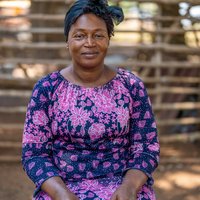People are admiring us so much in our community.”
Magdelene Bagura, Female Pastors Network (FEMINET) founder, nurse and midwife in Sierra Leone.
Lasting change starts small
Anywhere there is a vision, people can come together, and big changes can happen.
Five years ago life here in Port Loko, Sierra Leone, was hard. After the war, people had lost too much: their land and their animals. Then there was Ebola.
More recently, our rainy seasons changed, so the floods would destroy the crops. People didn’t have enough to eat, and our children were going to school hungry. But there was one day, in November 2017, when I said to myself, "We need to do something."
Doing more for ourselves, for our community
Born in [the 70s], I’m the firstborn in a family of six girls and one boy. I live with my husband in Port Loko town. He is a reverend.
I started nursing aged 18, then went to do general nursing and later midwifery. We have a women’s group called Female Pastors Network (FEMINET). We grow cassava and intend to build a production centre.
Our main goal is to pray together and to do something that will help us as women. Leading the group is no problem really.
“My big vision is for the group? Today, we have over 14 acres of farmland... but I want a factory to help us produce more gari, fufu and cassava flour. I also want a vocational centre where women can acquire vital skills and adult literacy. Life will be great if I get this. We will have a bigger farm and the flour will be bagged for sale nationwide, even for export. Consequently, more women will be employed, even those who are not FEMINET members.”
Magdalene Bagura is a nurse, a midwife and founder of women's group Female Pastors Network (FEMINET), Sierra Leone.
"We are laying the foundation, we have not yet reached the peak we want."
Lasting change starts small, with all of us. Will you start something today?
Growing cassava and the business
Training by Oxfam empowered us to enhance our crop yield and not wait for men to do everything for us. We also received 50 bundles of cassava stems, so we didn’t have to buy planting materials. The training sessions were important. For those who don’t understand English, the trainers were speaking local languages.
Oxfam also gave us a grant which we used to buy blocks of land where we grow cassava and intend to build a production centre. When we started producing gari, we divided the packets among ourselves for sale. The profit belongs to the sellers and they can use it to buy children’s needs. Children love our gari. They sing: “FEMINET gari for vitality and health." As a woman, when you see your child is happy, you are happy.
Being a midwife has helped the group
I work in shifts. I set aside time for prayer and farming when I am off. Being a midwife has helped the group. My profession is God’s calling to save lives. When Female Pastors Network (FEMINET) women fall pregnant or sick, I take care of them.
“Before the training, we were asking ourselves: what can we do with our cassava? After, we started asking: how can we add value to our harvest. We no longer eat and sell raw cassava. As a nurse, I was concerned that malnutrition is high in Port Loko. So, I said: Can’t we add some ingredients to our gari to keep children healthy? The group was excited. For example, protein renews body tissues; folic acid reduces blood shortage and iodised salt helps fight goitre. Sugar gives energy, so our children are not malnourished anymore.”
Magdalene Bagura, founder of women's group Female Pastors Network (FEMINET), nurse and midwife, Sierra Leone
About 80 percent of the homes in my community are mainly run by women. I assist them and their children so that medical bills will not be a burden for them. They feel very good. Currently, two women in my group are pregnant. I’m taking care of them during antenatal clinics. So far, I have helped over 15 women deliver safely. I’m so happy about that: a living mother and a living child.
We are no longer shy
My husband retired from public service three years back.
We support each other and our two children. In Sierra Leone, we have extended families, so a woman should have something to do. Before, many women were not bold to say something, but now they talk boldly anywhere they invite us.
People are admiring us so much in our community. Our work is important because it has started enlightening people on the ground.
We are no longer shy. We are happy to talk to anyone and people like us.
Just go to Port Loko town and ask people if they know Female Pastors Network (FEMINET), they will tell you what they know about us. They say: “These are sober-minded women with a vision; they don’t have a scattered mind.” People are proud of us, to be frank.
Bringing women together
The group brings together different women: young women, single parents, widows and people with disabilities. We opened the farm because the majority is not working. I tell them we need to work so that we add value to our lives and improve our livelihoods.
Now we are laying the foundations; we have not reached the peak we want. We have a vision to grow bigger both nationally and internationally by the grace of God. And I want every woman to learn to take care of herself financially, without depending on a man.
Alpha Sesay, Legacy Program Manager, Oxfam in Sierra Leone stands off the 14 acre cassava farm run by FEMINET in Port Loko, Sierra Leone. Credit: Nana Kofi Acquah / Oxfam.
Farming in Sierra Leone was disrupted by nearly a decade of war in the 1990s.
After the war, farmers returned to gutted homes and farmlands with few animals left. Crop yields kept falling and there was not enough food. On top of this, climate change and flooding made progress difficult.
Since 2019, Oxfam and its partners have supported farming business groups like Female Pastors Network (FEMINET) to grow more and add value to their harvests with training and high-yielding seed for cassava, maize and ginger. As well as Irish potatoes in the place of sweet potatoes and yams.


